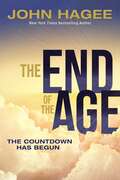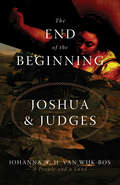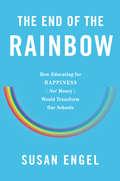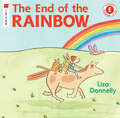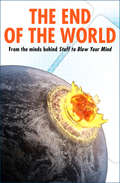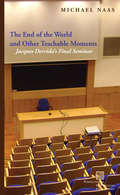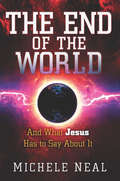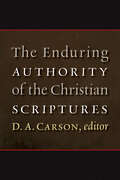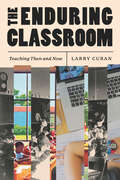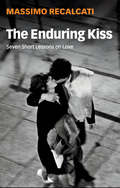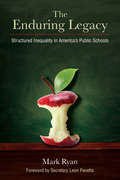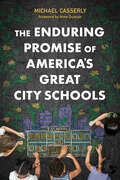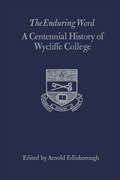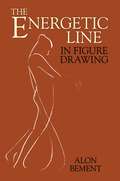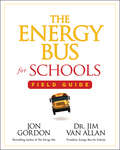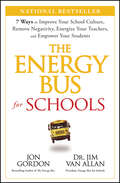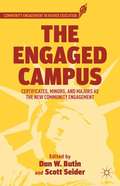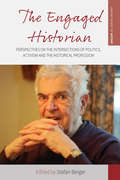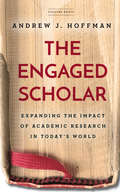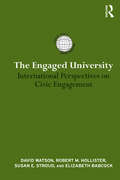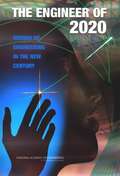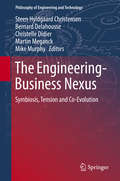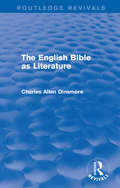- Table View
- List View
The End of the Age: The Countdown Has Begun
by John HageeIf you knew sudden destruction would fall upon the earth in the next twenty-four hours, how would you spend your last moments? Join New York Times bestselling author John Hagee as he uses Scripture as a guide to count down the prophetic minutes through the events which must occur before every individual faces God on Judgment Day.Charting international news events, including recent peace agreements in the Middle East, Hagee synchronizes these headlines with the biblical timeline for the last days, producing a compelling argument that life on Earth is about to expire. What else must take place before the arrival of Judgment Day?This very timely message discusses:The reality of virtual terrorismThe financial crisis and economic crashOpposing views of the RaptureRecent peace agreements in the Middle East that impact Israel and a potential Russian invasionNuclear warsThe purpose of the Tribulation and the MillenniumSignificantly updated and revised from its previous publication under the title From Daniel to Doomsday, this is quintessential Hagee on Bible prophecy and End-Times teaching. This insightful book is an ideal resource for Christians who are looking for a guide to what the Bible says about the end times--and how to recognize that they are approaching.Mark it down: The End of the Age is approaching, but it won't be ushered in by space aliens or catastrophic asteroids. Hagee guides us through the timeline before that fateful moment when every unredeemed individual must face God on Judgment Day.
The End of the Beginning: Joshua and Judges
by Johanna van Wijk-BosThe End of the Beginning presents a chapter-by-chapter interpretation of Joshua and Judges, based on the author&’s translation. Johanna van Wijk-Bos accompanies the reader through the story of Israel from the entry into Canaan up to the time of Samuel. van Wijk-Bos weaves together the memories of ancient Israel&’s past into a story that speaks to the traumatic context of postexilic Judah. The books of Joshua and Judges were written for education, edification, and entertainment. Some of the stories may exhilarate us, some may appall; all will speak to the imagination if we let them. They show a people forging a path forward into an uncertain future in the hope that God will forgive past failures and begin again with them. Christians enter the stories of Israel&’s past as outsiders, while at the same time claiming a bond with the same God. We expect more from the text than lessons of the past intended for a different people. These are not our stories, but we too hope for insight and for a guiding word in our own uncertain future. This is the first volume of A People and a Land, a multi-volume work on the historical books of Joshua, Judges, Samuel, and Kings.
The End of the Rainbow
by Susan EngelAmid the hype of Race to the Top, online experiments such as Khan Academy, and bestselling books like The Sandbox Investment, we seem to have drawn a line that leads from nursery school along a purely economic route, with money as the final stop. But what price do we all pay for the increasingly singular focus on wage as the outcome of education? Susan Engel, a leading psychologist and educator, argues that this economic framework has had a profound impact not only on the way we think about education but also on what happens inside school buildings.The End of the Rainbow asks what would happen if we changed the implicit goal of education and imagines how different things would be if we made happiness, rather than money, the graduation prize. Drawing on psychology, education theory, and a broad range of classroom experiences across the country, Engel offers a fascinating alternative view of what education might become: teaching children to read books for pleasure and self-expansion and encouraging collaboration. All of these new skills, she argues, would not only cultivate future success in the world of work but also would make society as a whole a better, happier place.Accessible to parents and teachers alike, The End of the Rainbow will be the beginning of a new, more vibrant public conversation about what the future of American education should look like.
The End of the Rainbow (I Like to Read)
by Liza DonnellyFind out what's waiting at the end of the rainbow in this Level E book, perfect for kids just beginning to read on their own. When a glorious, colorful rainbow spreads across the sky after a storm, a girl wonders what might be at the end. Setting out, she gathers traveling companions—a cat, a turtle, a horse. Everyone is excited! But even though the rainbow disappears before they reach the end, it's all right—they found something even better. . . new friends! Gentle pen-and-watercolor illustrations by The New Yorker cartoonist Liza Donnelly enhance the simple story, giving hints to what everyone expects to find at the end of their journey. The award-winning I Like to Read® series focuses on guided reading levels A through G, based upon Fountas and Pinnell standards. Acclaimed author-illustrators--including winners of Caldecott, Theodor Seuss Geisel, and Coretta Scott King honors—create original, high quality illustrations that support comprehension of simple text and are fun for kids to read with parents, teachers, or on their own! With an even wider range of high-frequency vocabulary, Level E stories feature a distinct beginning, middle, and end, with kid-friendly illustrations offering clues for more challenging sentences. Varied punctuation and simple contractions may be included.
The End of the World
by HowstuffworksFrom the endlessly curious editorial minds at HowStuffWorks.com comes a volume of easy-to-understand explanations of the top theories for how the world will end HowStuffWorks.com is the source for credible, unbiased explanations of how the world actually works. Our premise is simple: Demystify the world in a way that anyone can understand. In response to our readers, who are particularly curious about doomsday scenarios, we present The End of the World. Drawing on our editors' extensive research, this handy guide outlines the various theories of how the world as we know it could come to its end. There are more ways than ever to imagine our own doom, ranging from rogue black holes to solar superstorms to global pandemic. Our technological innovations in warfare alone mean that it would take very little--a push of a button--to destroy the planet in a nuclear cloud. Our world may seem robust and strong, but whether it's hit with a mile-wide asteroid or a microscopic mutated virus, the end will come one day. Read on to see how it could happen, which possibilities have the slimmest chances, and decide for yourself which scenario you think is most worth worrying about.
The End of the World and Other Teachable Moments: Jacques Derrida's Final Seminar (Perspectives in Continental Philosophy)
by Michael NaasThe End of the World and Other Teachable Moments follows the remarkable itinerary of Jacques Derrida’s final seminar, “The Beast and the Sovereign” (2001–3), as the explicit themes of the seminar—namely, sovereignty and the question of the animal—come to be supplemented and interrupted by questions of death, mourning, survival, the archive, and, especially, the end of the world.The book begins with Derrida’s analyses, in the first year of the seminar, of the question of the animal in the context of his other published works on the same subject. It then follows Derrida through the second year of the seminar, presented in Paris from December 2002 to March 2003, as a very different tone begins to make itself heard, one that wavers between melancholy and an extraordinary lucidity with regard to the end. Focusing the entire year on just two works, Daniel Defoe’s Robinson Crusoe and Martin Heidegger’s seminar of 1929–30, “The Fundamental Concepts of Metaphysics,” the seminar comes to be dominated by questions of the end of the world and of an originary violence that at once gives rise to and effaces all things.The End of the World and Other Teachable Moments follows Derrida as he responds from week to week to these emerging questions, as well as to important events unfolding around him, both world events—the aftermath of 9/11, the American invasion of Iraq—and more personal ones, from the death of Maurice Blanchot to intimations of his own death less than two years away. All this, the book concludes, makes this final seminar an absolutely unique work in Derrida’s corpus, one that both speaks of death as the end of the world and itself now testifies to that end—just one, though hardly the least, of its many teachable moments.
The End of the World: And What Jesus Has to Say About It
by Michele NealIn her new book about the end times, author Michele Neal highlights many of these prophesied events, and addresses the serious reality that the destiny of half-hearted Christians is in jeopardy. Sound asleep, spiritually, they are neither watching for the Bridegroom nor making themselves ready for His return and risk being caught unprepared. She also reveals from God’s Word the devastating eternal destiny of all who refuse to believe in Jesus, but offers to them the “way of escape.” Let Michele show you what you must do to wake up from this slumber. Don’t gamble with the consequences of sin. The End of the World (And What Jesus Has to Say About It) will help you now to get ready for the future! Time may be short—the Bridegroom will return . . . Are you ready?
The Enduring Authority of the Christian Scriptures
by D. A. CarsonValuable insights into key disputed topics from a veritable who's who of evangelical scholars In this volume thirty-seven first-rate evangelical scholars present a thorough study of biblical authority and a full range of issues connected to it. Recognizing that Scripture and its authority are now being both challenged and defended with renewed vigor, editor D. A. Carson assigned the topics that these select scholars address in the book. After an introduction by Carson to the many facets of the current discussion, the contributors present robust essays on relevant historical, biblical, theological, philosophical, epistemological, and comparative-religions topics. To conclude, Carson answers a number of frequently asked questions about the nature of Scripture, cross-referencing these FAQs to the preceding chapters. This comprehensive volume by a team of recognized experts will be the go-to reference on the nature and authority of the Bible for years to come. CONTRIBUTORS James Beilby Kirsten Birkett Henri A. G. Blocher Craig L. Blomberg D. A. Carson Graham A. Cole Stephen G. Dempster Daniel M. Doriani Simon Gathercole David Gibson Ida Glaser Paul Helm Charles E. Hill Peter F. Jensen Robert Kolb Anthony N. S. Lane Te-Li Lau Richard Lints V. Philips Long Thomas H. McCall Douglas J. Moo Andrew David Naselli Harold Netland Osvaldo Padilla Michael C. Rea Bradley N. Seeman Alex G. Smith R. Scott Smith Rodney L. Stiling Glenn S. Sunshine Timothy C. Tennent Mark D. Thompson Kevin J. Vanhoozer Bruce K. Waltke Barry G. Webb Peter J. Williams John D. Woodbridge
The Enduring Classroom: Teaching Then and Now
by Larry CubanA groundbreaking analysis of how teachers actually teach and have taught in the past. The quality and effectiveness of teaching are a constant subject of discussion within the profession and among the broader public. Most of that conversation focuses on the question of how teachers should teach. In The Enduring Classroom, veteran teacher and scholar of education Larry Cuban explores different questions, ones that just might be more important: How have teachers actually taught? How do they teach now? And what can we learn from both? Examining both past and present is crucial, Cuban explains. If reformers want teachers to adopt new techniques, they need to understand what teachers are currently doing if they want to have any hope of having their innovations implemented. Cuban takes us into classrooms then and now, using observations from contemporary research as well as a rich historical archive of classroom accounts, along the way asking larger questions about teacher training and the individual motivations of people in the classroom. Do teachers freely choose how to teach, or are they driven by their beliefs and values about teaching and learning? What role do students play in determining how teachers teach? Do teachers teach as they were taught? By asking and answering these and other policy questions with the aid of concrete data about actual classroom practices, Cuban helps us make a crucial step toward creating reforms that could actually improve instruction.
The Enduring Kiss: Seven Short Lessons on Love
by Massimo RecalcatiThe kiss is the image that, perhaps more than any other, encompasses the beauty and poetry of love. Every love is required to maintain the kiss, to make it last. When they kiss, lovers carve out their hiding holes, finding their peace from war. When they kiss, the noise of the world is silenced, its laws broken, time is stolen from its normal continuity. They fall together in their distinct, embraced tongues. The kiss joins the tongue that declares love with the body of the lover. And the extinction of the kiss and, most importantly, of the desire to kiss one’s beloved announces the demise of love. In this short book, Massimo Recalcati – one of Italy’s leading intellectuals and bestselling authors – offers seven brief lessons on the mystery and miracle of love, from the serendipity of the first encounter to its end or its continuation over time, as mysterious and miraculous as the first encounter itself.
The Enduring Legacy: Structured Inequality in America's Public Schools
by Mark Edward RyanEnduring Legacy describes a multifaceted paradox—a constant struggle between those who espouse a message of hope and inclusion and others who systematically plan for exclusion. Structured inequality in the nation’s schools is deeply connected to social stratification within American society. This paradox began in the eighteenth century and has proved an enduring legacy. Mark Ryan provides historical, political, and pedagogical contexts for teacher candidates—not only to comprehend the nature of racial segregation but, as future educators, to understand their own professional responsibilities, both in the community and in the school, to strive for an integrated classroom where all children have a chance to succeed. The goal of providing every child a world-class education is an ethical imperative, an inherent necessity for a functioning pluralistic democracy. The challenge is both great and growing, for teachers today will face an evermore segregated American classroom.
The Enduring Legacy: Structured Inequality in America’s Public Schools
by Mark RyanEnduring Legacy describes a multifaceted paradox—a constant struggle between those who espouse a message of hope and inclusion and others who systematically plan for exclusion. Structured inequality in the nation’s schools is deeply connected to social stratification within American society. This paradox began in the eighteenth century and has proved an enduring legacy. Mark Ryan provides historical, political, and pedagogical contexts for teacher candidates—not only to comprehend the nature of racial segregation but, as future educators, to understand their own professional responsibilities, both in the community and in the school, to strive for an integrated classroom where all children have a chance to succeed. The goal of providing every child a world-class education is an ethical imperative, an inherent necessity for a functioning pluralistic democracy. The challenge is both great and growing, for teachers today will face an evermore segregated American classroom.
The Enduring Promise of America’s Great City Schools
by Michael CasserlyA sober yet encouraging look at how urban public schools have confronted challenges, defied expectations, and continued to improve
The Enduring Word: A Centennial History of Wycliffe College
by Arnold EdinboroughSince Wycliffe College was founded 100 years ago as an Anglican theological college in Toronto, it has had six principals. To celebrate the influence they and the college have had on the religious life of Canada and other countries, six writers have collaborated to produce The Enduring Word. The lives of the five past principals have been written by Jacob Jocz, T.R. Millman, R.K. Harrison, Alan Hayes, and Robert Finch. Arnold Edinborough's profile of the present principal, Dr Reginald Stackhouse provides insight into both the man and the kinds of challenges he faces as he leads Wycliffe into its second century. Rich in anecdote and sound in research, The Enduring Word is a centennial volume whose interest goes far beyond the college and its members pas and present.
The Energetic Line in Figure Drawing
by Alon BementWell-crafted and class-tested, this guide to figure drawing features a unique teaching method. It focuses on learning to draw complete figures prior to the study of individual components, and it stresses action figures rather than the customary static examples favored by most drawing and anatomy texts. Employing more text than typical art instruction books, it presents thirty figure drawing lessons and fifty-six drawings and figures. Each lesson includes detailed instructions on anatomical drawing, accompanied by visual examples of strokes, boxes, and measurements. Author Alon Bement taught art instruction to future art teachers at Columbia University and later founded the prestigious Maryland Institute of Art. His students included Georgia O'Keeffe, who regarded him as a mentor and major influence. Bement's nontraditional approach offers students at all levels an excellent opportunity to build their visual acuity and technical skills.
The Energy Bus for Schools Field Guide
by Jon Gordon Jim Van AllanImplement the exciting solutions and strategies from the bestselling The Energy Bus for Schools with this practical collection of hands-on resources In The Energy Bus for Schools Field Guide, bestselling author Jon Gordon and respected education leader and speaker Dr. Jim Van Allan deliver an easy-to-use roadmap for transforming the insights found in the author's companion book, The Energy Bus for Schools, into effective and powerful solutions for schools everywhere. This Field Guide is a practical resource designed to help you live and apply the invaluable lessons of The Energy Bus for Schools immediately. Readers will use the Field Guide's templates, tools, and other resources to create an exciting and collaborative school culture where students and staff can develop as leaders together. The Guide also contains: Resources to help empower staff and students and build connected teams Hands-on strategies for strengthening relationships between and amongst staff, administrators, students, and parents Ways to eliminate the negativity that sabotages morale and culture Filled with insightful questions, best practices, inspirational case studies from real schools finding new ways to succeed and thrive, and practical action steps and implementations, The Energy Bus for Schools Field Guide equips you to energize yourself, your team, your students, and their parents in original and powerful ways. It's an essential resource for everyone interested in bringing to life the one-of-a-kind vision offered by The Energy Bus for Schools.
The Energy Bus for Schools: 7 Ways to Improve your School Culture, Remove Negativity, Energize Your Teachers, and Empower Your Students (Jon Gordon)
by Jon Gordon Jim Van AllanDrive Your School Culture to Success with The Energy Bus! Transform your school culture into a thriving and positive environment. In The Energy Bus for Schools: 7 Ways to Improve Your School Culture, Remove Negativity, Energize Your Teachers, and Empower Your Students, bestselling author Jon Gordon and education leader Dr. Jim Van Allan provide concrete strategies and powerful stories to help build a positive school culture. This book shares a unique approach and proven practices for reimagining schools and districts as collaborative places where students and staff create their culture and develop as leaders together. The authors provide the blueprint and framework to create a positive campus culture including: Thriving during times of change Communication to strengthen relationships Proven strategies to empower staff and students Building a connected team Developing a positive mindset Implementing best practices to energize teachers and students Removing negativity that sabotages morale and culture Rediscovering the joy and excitement of being in education This book is intended for superintendents, district and school leadership, teachers, counselors, and coaches who are looking to leave a positive legacy and impact everyone on campus. Join the movement with other visionary educators who have already transformed their schools into dynamic centers of learning and growth.
The Engaged Campus
by Scott Seider Dan W. ButinThe Engaged Campus offers a set of emerging best practices and articulation of critical issues for faculty and administrators committed to developing, strengthening, or expanding majors or minors in community engagement at their respective institutions.
The Engaged Historian: Perspectives on the Intersections of Politics, Activism and the Historical Profession (Making Sense of History #37)
by Stefan BergerOn the surface, historical scholarship might seem thoroughly incompatible with political engagement: the ideal historian, many imagine, is a disinterested observer focused exclusively on the past. In truth, however, political action and historical research have been deeply intertwined for as long as the historical profession has existed. In this insightful collection, practicing historians analyze, reflect on, and share their experiences of this complex relationship. From the influence of historical scholarship on world political leaders to the present-day participation of researchers in post-conflict societies and the Occupy movement, these studies afford distinctive, humane, and stimulating views on historical practice and practitioners
The Engaged Historian: Perspectives on the Intersections of Politics, Activism and the Historical Profession (Making Sense of History #37)
by Stefan BergerOn the surface, historical scholarship might seem thoroughly incompatible with political engagement: the ideal historian, many imagine, is a disinterested observer focused exclusively on the past. In truth, however, political action and historical research have been deeply intertwined for as long as the historical profession has existed. In this insightful collection, practicing historians analyze, reflect on, and share their experiences of this complex relationship. From the influence of historical scholarship on world political leaders to the present-day participation of researchers in post-conflict societies and the Occupy movement, these studies afford distinctive, humane, and stimulating views on historical practice and practitioners
The Engaged Scholar: Expanding the Impact of Academic Research in Today’s World
by Andrew J. HoffmanSociety and democracy are ever threatened by the fall of fact. Rigorous analysis of facts, the hard boundary between truth and opinion, and fidelity to reputable sources of factual information are all in alarming decline. A 2018 report published by the RAND Corporation labeled this problem "truth decay" and Andrew J. Hoffman lays the challenge of fixing it at the door of the academy. But, as he points out, academia is prevented from carrying this out due to its own existential crisis—a crisis of relevance. Scholarship rarely moves very far beyond the walls of the academy and is certainly not accessing the primarily civic spaces it needs to reach in order to mitigate truth corruption. In this brief but compelling book, Hoffman draws upon existing literature and personal experience to bring attention to the problem of academic insularity—where it comes from and where, if left to grow unchecked, it will go—and argues for the emergence of a more publicly and politically engaged scholar. This book is a call to make that path toward public engagement more acceptable and legitimate for those who do it; to enlarge the tent to be inclusive of multiple ways that one enacts the role of academic scholar in today's world.
The Engaged University: International Perspectives on Civic Engagement (International Studies in Higher Education)
by David Watson Robert Hollister Susan E. Stroud Elizabeth BabcockThe Engaged University is a comprehensive empirical account of the global civic engagement movement in higher education. In universities around the world, something extraordinary is underway. Mobilizing their human and intellectual resources, institutions of higher education are directly tackling community problems – combating poverty, improving public health, and restoring environmental quality. This book documents and analyzes this exciting trend through studies of civic engagement and social responsibility at twenty institutions worldwide. This timely volume offers three special contributions to the literature on higher education policy and practice: a historical overview of the founding purposes of universities, which almost invariably included a context-specific element of social purpose, together with a survey of how these "founding" intentions have fared in different systems of higher education; a contemporary account of the policy and practice of universities – all over the world – seeking to re-engage with this social purpose; and an overview of generic issues which emerge for the "engaged university."
The Engineer Of 2020: Visions Of Engineering In The New Century
by National Academy of Engineering of the National AcademiesThe National Academies Press (NAP)--publisher for the National Academies--publishes more than 200 books a year offering the most authoritative views, definitive information, and groundbreaking recommendations on a wide range of topics in science, engineering, and health. Our books are unique in that they are authored by the nation's leading experts in every scientific field.
The Engineering-Business Nexus: Symbiosis, Tension and Co-Evolution (Philosophy of Engineering and Technology #32)
by Steen Hyldgaard Christensen Christelle Didier Martin Meganck Mike Murphy Bernard DelahousseFascinating and compelling in equal measure this volume presents a critical examination of the multilayered relationships between engineering and business. In so doing the study also stimulates ethical reflection on how these relationships either enhance or inhibit strategies to address vital issues of our time. In the context of geopolitical, economic, and environmental tendencies the authors explore the world that we should want to create and the role of the engineer and the business manager in this endeavor. Throughout this volume the authors identify periods of alignment and periods of tension between engineering and business. They look at focal points of the engineering-business nexus related to the development of capitalism. The book explores past and present movements to reshape, reform, or reject this nexus.The volume is informed by questions of importance for industry as well as for higher education. These are: What kinds of conflict arise for engineers in their attempts to straddle both professional and organizational commitments? How should professionals be managed to avoid a clash of managerial and professional cultures? How do engineers create value in firms and corporations? What kinds of tension exist between higher education and industry? What challenges does the neoliberal entrepreneurial university pose for management, faculty, students, society, and industry? Should engineering graduates be ready for work, and can they possibly be? What kinds of business issues are reflected in engineering education curricula, and for what purpose? Is there a limit to the degree of business hybridization in engineering degree programs, and if so, what would be the criterion for its definition? Is there a place in engineering education curricula for reflective critique of assumptions related to business and economic thinking? One ideal of management and control comes to the fore as the Anthropocene - the world transformed into an engineered artefact which includes human existence. The volume raises the question as to how engineering and business together should be considered, given the fact that the current engineering-business nexus remains embedded within an economic model of continual growth. By addressing macro-level issues such as energy policy, sustainable development, globalization, and social justice this study will both help create awareness and stimulate development of self-knowledge among practitioners, educators, and students thereby ultimately addressing the need for better informed citizens to safeguard planet Earth as a human life supporting system.
The English Bible as Literature (Routledge Revivals)
by Charles Allen DinsmoreThe religious associations surrounding the Bible make it difficult for the general reader to appreciate, in its full purity, the value which the Scriptures bear as literature, and as an epic in no way inferior, in cultural worth, to the greatest works of Greece and Rome. Dealing as it does with elementary passions and principles, the English Bible is, in the author’s view, the greatest book of all the ages. This book, first published in 1931, will be of interest to students of literature and religious studies.
